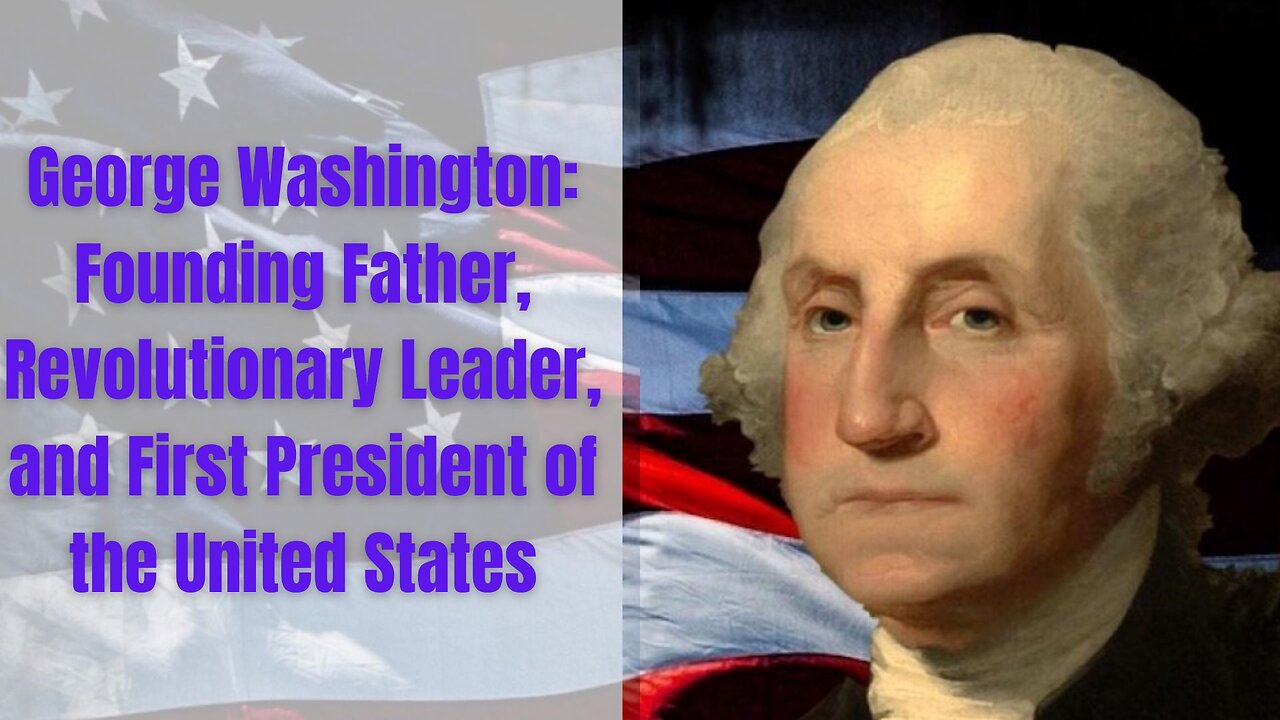Premium Only Content

George Washington: Founding Father, Revolutionary Leader, and First President of the United States
George Washington, born on February 22, 1732, in Westmoreland County, Virginia, is an iconic figure in American history, renowned for his pivotal role in the founding of the United States and his leadership as the nation's first President. His legacy encompasses his military leadership during the American Revolutionary War, his crucial contributions to the drafting of the U.S. Constitution, and his establishment of presidential precedents that continue to influence the country to this day.
Washington's early life was marked by his pursuit of education and land surveying, skills that would prove invaluable in his later endeavors. He entered military service during the French and Indian War, where he gained experience and recognition for his leadership abilities. His dedication to duty and discipline earned him the respect of his peers.
However, Washington's most significant contributions came during the American Revolutionary War. In 1775, he was appointed as the commander-in-chief of the Continental Army by the Second Continental Congress. Despite facing numerous challenges, including limited resources and an inexperienced army, Washington demonstrated remarkable strategic skill and resilience. His leadership during critical battles such as Trenton, Saratoga, and Yorktown played a decisive role in securing American independence from British rule.
Washington's conduct during the war demonstrated his commitment to the principles of republicanism and civilian control over the military, a sentiment that would guide his actions as a statesman. After the war's conclusion, he famously relinquished his military commission in 1783, setting a precedent for the peaceful transfer of power and preventing the emergence of a military dictatorship.
Washington's role in the Constitutional Convention of 1787 was instrumental in shaping the U.S. Constitution. His reputation and credibility lent significant weight to the proceedings, and he was unanimously elected as the president of the convention. His influence helped bridge the gap between various factions, leading to compromises that ultimately formed the foundation of the new government.
When the United States became a fully independent nation, Washington's popularity and respect made him the natural choice for the nation's first President. In 1789, he was unanimously elected to the office. As President, he faced numerous challenges, including establishing the executive branch's authority, shaping foreign policy, and addressing domestic issues such as the Whiskey Rebellion. Washington's leadership style emphasized the importance of a strong federal government balanced with individual liberties, setting enduring precedents for the presidency's scope and power.
Perhaps one of Washington's most significant contributions was his voluntary decision to step down after serving two terms as President, reinforcing the principle of peaceful transitions of power and preventing the establishment of a monarchy. This act solidified the idea that the President should be a servant of the people rather than a ruler.
George Washington's impact extends beyond his tangible accomplishments. His character, integrity, and commitment to the nation's ideals have made him a symbol of American values and leadership. His legacy continues to inspire leaders around the world to uphold democratic principles, pursue justice, and strive for the greater good. As the "Father of His Country," George Washington remains an exemplar of selfless leadership and a foundational figure in American history.
-
 14:47
14:47
Tactical Considerations
12 hours agoClassic Precision Woox Furiosa Bergara Premier 6.5 CREED
192 -
 40:44
40:44
Rethinking the Dollar
20 hours agoDonald & Elon Head to Fort Knox—What Are They Planning?
7763 -
 1:10:15
1:10:15
MTNTOUGH Fitness Lab
21 hours ago"My Baseball Career Wasn't Enough": Adam LaRoche's Life-Changing Anti-Trafficking M
1801 -
 1:00:12
1:00:12
The Tom Renz Show
16 hours agoComing to America & Coming to Christ
7.37K -
 1:12:21
1:12:21
TheRyanMcMillanShow
21 hours agoDebbie Lee: Mother of First Navy Seal Killed In Iraq, Marc Lee - RMS 019
161 -
 38:05
38:05
Uncommon Sense In Current Times
14 hours agoIs Israel Being Forced Into a Bad Deal? David Rubin Exposes the Truth | Uncommon Sense
603 -

FreshandFit
8 hours agoAfter Hours w/ Girls
96.6K68 -
 2:33:58
2:33:58
TimcastIRL
11 hours agoDan Bongino ACCEPTS Deputy FBI Director, SECRET NSA CHATS EXPOSED w/Joey Mannarino | Timcast IRL
163K88 -
 1:09:33
1:09:33
Glenn Greenwald
15 hours agoMichael Tracey Reports from CPAC: Exclusive Interviews with Liz Truss, Steve Bannon & More | SYSTEM UPDATE #412
105K88 -
 56:02
56:02
Sarah Westall
12 hours agoBiohacking & Peptides: Weight loss, Anti-Aging & Performance – Myth vs Reality w/ Dr. Diane Kazer
60.6K21